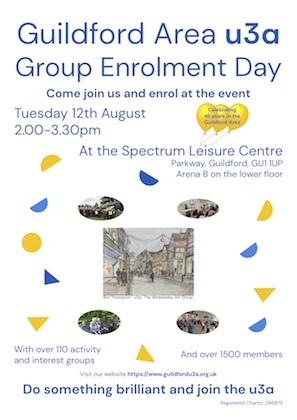 Abraham Lincoln
If given the truth, the people can be depended upon to meet any national crisis...
Abraham Lincoln
If given the truth, the people can be depended upon to meet any national crisis...
 Guildford news...
for Guildford people, brought to you by Guildford reporters - Guildford's own news service
Guildford news...
for Guildford people, brought to you by Guildford reporters - Guildford's own news service
Letter: Political Parties Are An Inevitable Part of Government
Published on: 1 Mar, 2017
Updated on: 1 Mar, 2017
In his comment on council leader Paul Spooner’s letter: Who Does Hon Alderman Bernard Parke Support? Ben Paton repeats a familiar refrain, asking the question: Why do we need political parties on (insert any council name here) at all?
Well I’m a member of a political party so I’d like to offer a stab at an answer.
An old saying goes “to govern is to choose” and it is very much correct. Even when it comes to matters like rubbish collections, council housing and arts funding, it will always be the case that the people in charge are forced to make choices as to what to prioritise. Quite often these choices aren’t easy or pleasant.
So often one of the most important things about a politician is what values they’ll use to decide which choices to make. For example, if there was a choice to be made between economic growth and jobs or protecting the local environment, which choice would their values lead them to make?
Now let’s imagine we had a council made up entirely of councillors independent of any political party. It should be obvious that they’re not always going to agree and that, even with the best will in the world, different councillors would have different perspectives on what the “right” choices would be.
So what you’d then find is that councillors would naturally start to work together with other councillors who shared their views. It’s human nature to form teams and to work together to achieve a common goal.
Then, inevitably, at some point, you would arrive at a choice where the different groups were completely at odds thanks to their different perspectives. So at the next election the different groups of councillors would probably each issue some sort of joint statement as to what their stance was on the contentious issue of the day.
Eventually the different groups are likely to decide it made sense to formalise their arrangements and adopt a common label. They would become political parties.
Because political parties make sense. Because they don’t just exist for no reason.
Every political party is held together internally by a common set of values and a common perspective on the world. They are made up of individual people who want to work together towards a common aim with people who share their values.
And every political party acts as a shortcut to help voters decide who to vote for. Without knowing anything else about a candidate, which party they’re affiliated with will tell you a lot about the values they’d use to guide their decisions when voting in council meetings.
And because this kind of shortcut is useful to voters who have limited time to spend learning about all the candidate standing, political parties will always be more successful in the long run than a lone individual standing for election.
So even if we were to abolish all political parties it would only be a matter of time before new ones emerged to take their place.
And no doubt we would still get people complaining about their existence and whining about how underhand it is that councillors who share the same values mysteriously tend to all vote the same way at council meeting.
Responses to Letter: Political Parties Are An Inevitable Part of Government
Leave a Comment Cancel reply
Please see our comments policy. All comments are moderated and may take time to appear. Full names, or at least initial and surname, must be given.
Click on cartoon for Dragon story: Public Asked for Views on SCC’s Proposal for Reduced Speed Limits



Recent Articles
- Residents Hit By CIL Fees Should Be Offered Full Review, Says Overview Committee
- Plans For New Guildford Preschool Rejected On Road Safety Grounds
- Expert in AI Is New Head of the University of Surrey
- From East Clandon to Paris – Charity Cyclists Complete Epic 24-hour Challenge
- Updated: Local MPs Vote in Favour of Assisted Dying
- Guildford Plans Three-Day Celebration In a Festival of History And Culture
- Local Therapy Garden Supporting Mental Health Shortlisted for BBC Award
- Thousands of Year Six Pupils at Guildford Cathedral for a Special Send Off
- New Surrey Research to Find Solutions to Local Challenges
- Comment: What Are We To Make of the GBC Executive ‘Reshuffle’?


Recent Comments
- John Redpath on ‘Politics Is Not Always a Kind Place’ Says Dismissed Lead Councillor
- Jules Cranwell on ‘Politics Is Not Always a Kind Place’ Says Dismissed Lead Councillor
- Ben Paton on ‘Politics Is Not Always a Kind Place’ Says Dismissed Lead Councillor
- Angela Gunning on ‘Politics Is Not Always a Kind Place’ Says Dismissed Lead Councillor
- Nigel Keane on A281 At Shalford Has Now Reopened Following Repairs to Damaged Roof
- N Hatcher on New Electric Trains Now Arriving at Guildford – 100 Years After the First One Did
Search in Site
Media Gallery
Dragon Interview: Local Artist Leaves Her Mark At One of England’s Most Historic Buildings
January 21, 2023 / No Comment / Read MoreDragon Interview: Lib Dem Planning Chair: ‘Current Policy Doesn’t Work for Local People’
January 19, 2023 / No Comment / Read MoreA3 Tunnel in Guildford ‘Necessary’ for New Homes, Says Guildford’s MP
January 10, 2023 / No Comment / Read More‘Madness’ for London Road Scheme to Go Ahead Against ‘Huge Opposition’, Says SCC Leader
January 6, 2023 / No Comment / Read MoreCouncillor’s Son Starts Campaign for More Consultation on North Street Plan
December 30, 2022 / No Comment / Read MoreCounty Council Climbs Down Over London Road Works – Further ‘Engagement’ Period Announced
December 14, 2022 / No Comment / Read MoreDragon Interview: GBC Reaction to the Government’s Expected Decision to Relax Housing Targets
December 7, 2022 / No Comment / Read MoreHow Can Our Town Centre Businesses Recover? Watch the Shop Front Debate
May 18, 2020 / No Comment / Read More







Lisa Wright
March 1, 2017 at 11:17 am
Whilst I understand George Potter’s line of thought, I would like to add that at Parish Council meetings we too have differing opinions. Sometimes I agree with everyone, other times not. Sometimes I agree with some people on a particular issue and at other times disagree with the same people on a different issue.
So, it is very difficult, at a parish level, to be considered part of any particular political party. Surely borough councillors should have the flexibility to decide with their own conscious whether they support or object to the items being discussed, this is not always noticeable at council meetings where many do appear to toe the ‘party line’.
However, I notice in recent decisions, an example being the SANG application at Frog Grove Lane, that councillors, especially in the Conservative party, are starting to vote for what’s right instead of what the boss says. Long may it continue.
Sue Fox
March 1, 2017 at 12:28 pm
As a Liberal/Lib Dem since my teens and a former councillor I have always voted for my beliefs. I have never been ‘whipped’ as other parties on Guildford Borough Council have been, I’m a natural rebel, the bane of many of the leaders of my party.
No one ever threatened or attempted to deter me, there were occasions when the Stoughton councillors were lone voices, voting against all others in defence of their electorate. It’s a pity we couldn’t persuade others but we tried.
Another reason for political parties is elections and the need for help contact everyone in the ward, constituency etc. not just deliver a leaflet every four or five years. Free post is nothing compared with face to face contact.
John Perkins
March 3, 2017 at 3:51 pm
In order to save having to evaluate which party is most likely to make the decisions that we might make ourselves, perhaps we could just have one?
Better still might be a single person as it would resolve the potential for dissent within the party. We might give it a suitable title and absolute power. That way we would only need help to vote once.
John Lomas
March 4, 2017 at 2:08 pm
I don’t think I have, in 57 years, agreed with everything a party has proposed in it’s election aims and objectives.
I then have to choose on the basis of perhaps two or three policies and accept some I don’t like at all.
If we had the opportunity to vote on policies (not feasible I know) I could easily be voting for parts of all three or four candidates’ aims.